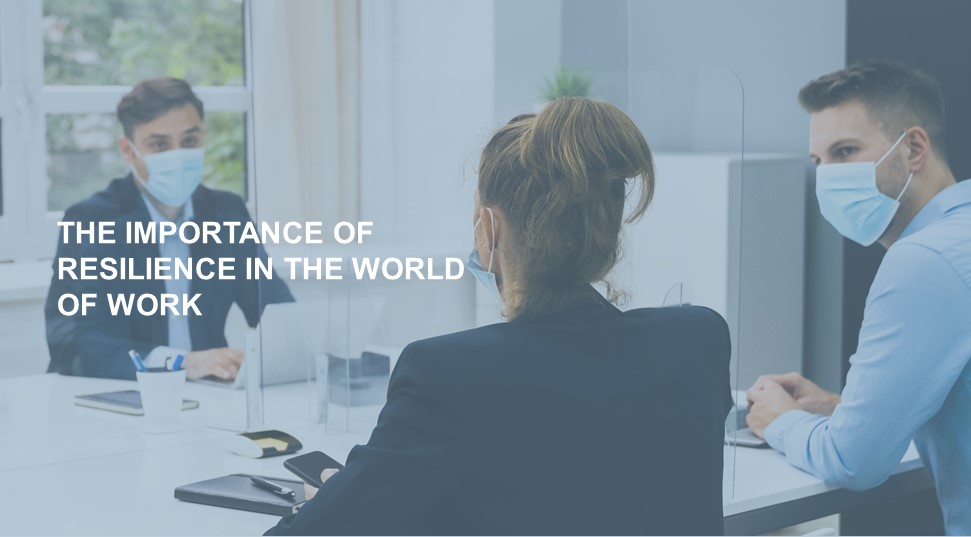

As we start to emerge from a third national lockdown in the UK, being and becoming more resilient, both in our personal and professional lives, continues to be vitally important. There can be no doubt that there is still a tremendous amount of change for any individual to come to terms with right now. Those who are more resilient in character will be better able to cope with pressure and move forward through adversity, perhaps even to flourish through it.
Read on to discover expert insight from our Chief People Officer, Caroline Lansbury, on the importance of supporting your workforce to become more resilient as well as her 7 resilience building tips.
The importance of resilience
At the individual level, there are of course, real health and wellness benefits of being resilient and in these times, we need to build resilience in ourselves quickly and in spades! People who develop resilience are better able to face disappointment, learn from failure, cope with loss and adapt to change. They report better physical and emotional wellbeing, which generally results in greater optimism; an attribute that is needed in the current climate more than ever before.
These are life changing abilities that can change the trajectory of our lives and careers. So much so, that teaching resilience to young children has become a huge topic within education, with much focus on the development of ‘growth mindsets’ i.e. children with the emotional capacity to fail, learn and move on. The same parallels can be made in adulthood and the role of employers can take by supporting their staff to become more resilient.
There are also huge benefits to be gained at the team and organisational level. The ability or inability of the workforce to be resilient, learn from failure and adapt to change in times of crisis, directly impacts an organisation’s productivity, survival and growth.
I have no doubt that there will be many businesses that will emerge from this pandemic with more resilience and it will be those individuals, teams and leaders who have embraced and adapted to change quickly that will have made the difference.
Employers are starting to invest in resilience coaching
As the benefits of resilience in the workplace come to the fore, more and more forward thinking employers are starting to invest in resilience coaching and equipping their leaders with the skills and knowledge to share and build resilience in their teams.
The comfort blanket of knowing what today, tomorrow or next week will look like has been ripped from people’s shoulders and for many younger generations this is the first global crisis they have faced. As a result, everyone is realising just how important people’s ability to cope with all this change is, both to an individual’s mental health and to an organisation’s ability to adapt and keep moving forward.
We are all learning to work in an increasingly complex, uncertain and ambiguous world but good business leaders will be taking decisive action, focusing on what they can influence and not worrying about what they can’t. They will also be endeavoring to provide their teams with the opportunities, knowledge and tools to foster positivity. Many are doing this with formal resilience coaching.
I feel passionately that a coaching approach most effectively supports individuals and teams to achieve beyond their perceived limitations. Coaching helps individuals and teams to be creative, to identify opportunities, to consider all options available and most importantly, it generates greater awareness and responsibility in the individual or group, which enhances the commitment needed to make lasting change happen. It also improves self-confidence and self-esteem. It helps the stuck get unstuck! True coaching improves employee and organisational resiliency and effectiveness during change.
Leaders who coach; increasing the emotional resilience of those they manage in the process, might alter the trajectory of their employee’s lives as well as fortify productivity and business continuity in times of crisis. Surely that’s something well worth pursuing.

7 resilience building tips
1. Build healthy habits into your routines. Remember that resilience is not about 'getting back to where you were before'. In the current climate, resilience is more about being flexible in our lives, thoughts and emotions and learning in order to adapt and find meaning in the new landscape. Identify the healthy habits that support your capacity for greater emotional resilience and build them into your routines.
2. Be clear on your personal values. Your core value are your NorthStar, your guiding light for decision making. Be clear on your personal values and your purpose. Regardless of the current situation, these can support your ability for clear decision making and provide a sense of fulfilment.
3. Notice what you notice. Are you stuck or becoming despondent when something feels too daunting? Every journey starts with a first step. Coaches support their teams to consider what the change is that will make the most significant difference to a situation. Frequently, this is the smallest shift in thinking or approach.
4. Be kind to yourself. We are all in the process of accepting what has changed for us, some of the change can bring out big emotions including sadness, fear or anger. This is normal, it’s how quickly we can accept the change and adapt that counts! Consider how you best manage your emotions and try not to let the amygdala hijack happen notice what you notice. Do you want to have the thoughts and feelings that you do? If the answer is no, the amygdala might be in control.
5. Focus on what you can influence. You will have new choices you will develop new behaviours. Find out what works, reflect on the positive and learn from the hurdles. Make stress your friend to change the way that your body responds to it. Remember that its ok to fail so long as you learn and grow.
6. Know where you sit on the Change Curve (Kubler Ross). This is a useful way to identify where you might be stuck and to move to a more positive, future focussed place by design. Do you have lots of change curves overlaid on top of one another that would benefit from being identified to make them more manageable? The complex and high-volume nature of the change that we are experiencing now can create even greater confusion. As a coaching leader, to help individuals to shine a light on these layers and separate them out to then become manageable, will pay dividends.
7. Build healthy habits into your routines. If you are having a large ‘stress bucket’ kind of a day - share your resilience with your team! The feelings that are most transformative are usually the ones that people avoid the most - are you providing opportunities to put your teams outside of their comfort zone - are you enabling or stifling personal growth? The best leaders lead by example but also trust, empower, challenge and feedback they coach. Seek out coaching support personally and provide it generously where you are able.
Support your workforce to become more resilient, download our full insight paper to learn more.
Similar blogs

.jpg)



